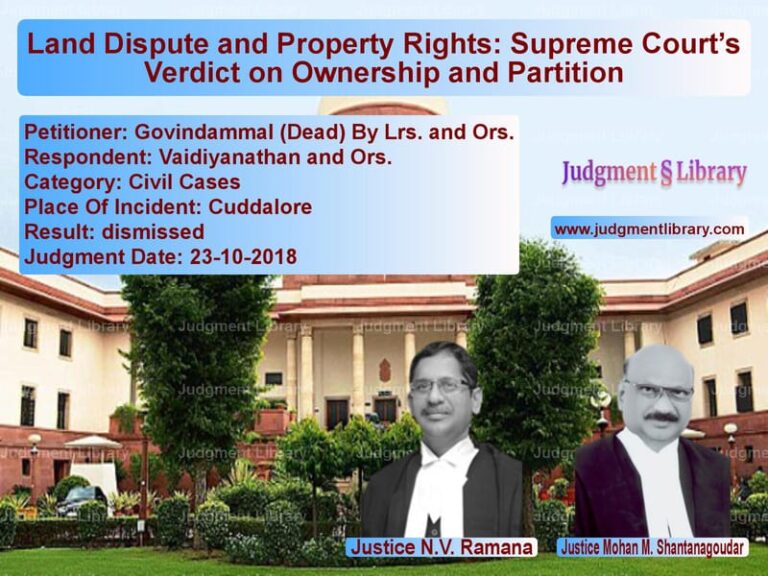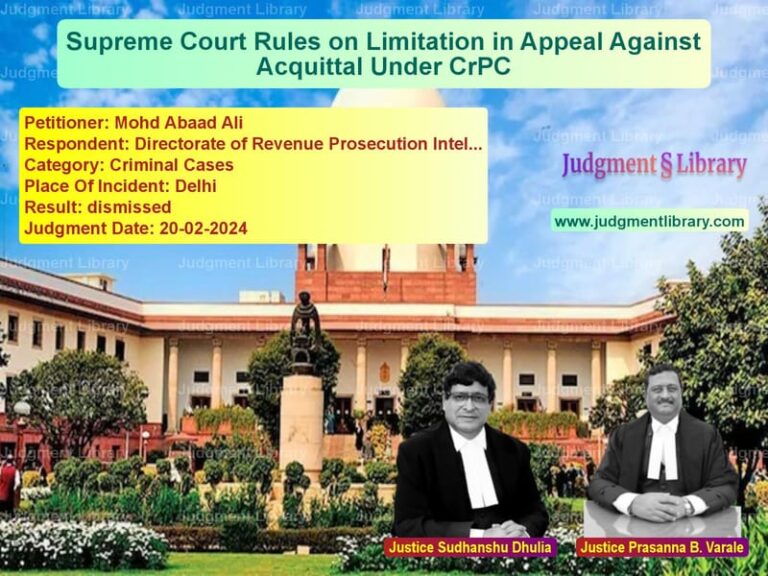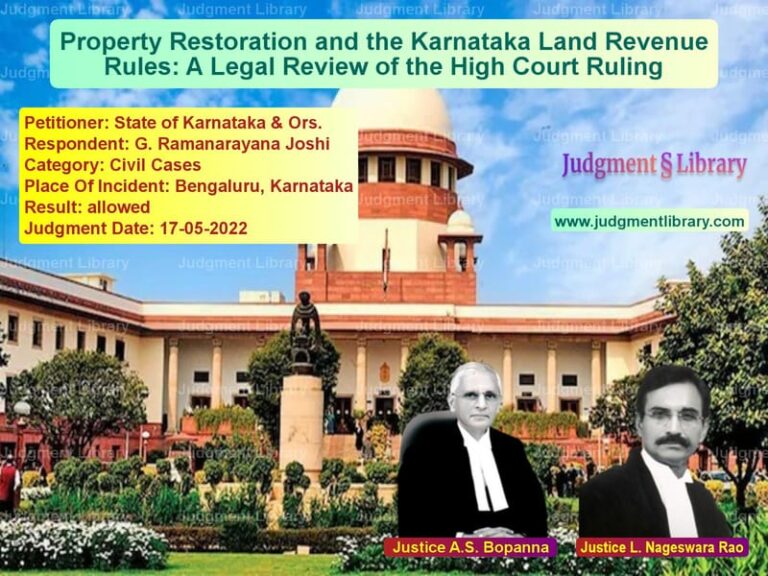Supreme Court Denies Medical Termination of Pregnancy Beyond Legal Limit
The case of Sheetal Shankar Salvi and Anr. v. Union of India and Ors. is a landmark ruling by the Supreme Court regarding the termination of pregnancy beyond the legally permissible limit. The petition was filed under Article 32 of the Constitution, seeking permission for a medical termination of pregnancy at 27 weeks due to severe fetal abnormalities. The Court, after reviewing a detailed medical board report, denied the request, stating that termination was not advised on medical grounds.
Background of the Case
Petitioner No. 1, Sheetal Shankar Salvi, was into her 27th week of pregnancy when she approached the Supreme Court, seeking permission for medical termination. She argued that the fetus had been diagnosed with multiple severe anomalies, including polyhydramnios, Arnold-Chiari malformation Type 2, hydrocephalus, lumbosacral meningo myelocele, spina bifida, and tethered cord.
The Supreme Court directed a seven-member Medical Board at KEM Hospital, Mumbai, to examine the petitioner and submit a report on whether the termination of pregnancy was advisable.
Medical Board’s Findings
The Medical Board, after examining the petitioner, submitted its report on March 25, 2017, highlighting the following key points:
- The fetus was diagnosed with severe congenital anomalies that would compromise postnatal quality of life.
- The mother’s physical condition was normal, and there was no physical risk to her due to continuation or termination of pregnancy.
- If the pregnancy was terminated at 27 weeks, the baby might be born alive and survive for an indeterminate period.
- The Board did not recommend medical termination of pregnancy (MTP) on medical grounds.
Petitioner’s Arguments
The petitioner’s legal counsel made the following arguments before the Supreme Court:
- The fetus was diagnosed with multiple severe congenital abnormalities, making postnatal survival difficult.
- The pregnancy was causing extreme anxiety and mental distress to the mother.
- Since medical advancements allowed for safe late-term terminations, the Court should grant permission as an exception to the legal limit.
Respondent’s Counterarguments
The Union of India opposed the petition, arguing:
- The Medical Board did not find any risk to the mother’s life.
- The Medical Termination of Pregnancy (MTP) Act, 1971, does not permit terminations beyond 20 weeks unless there is a threat to the mother’s life.
- The Court should not make exceptions to established legal frameworks.
Supreme Court’s Judgment
The Supreme Court, comprising Justices S.A. Bobde and L. Nageswara Rao, ruled as follows:
- Since the Medical Board did not recommend termination on medical grounds, the Court would not intervene.
- The possibility that the baby might be born alive and survive for an uncertain period weighed against granting permission for termination.
- Anxiety about the pregnancy’s outcome was not a sufficient reason to override the legal limit.
- The writ petition was dismissed.
Key Legal Takeaways
The Supreme Court’s ruling clarifies several important legal principles related to abortion laws in India:
- Strict Adherence to the MTP Act: The Court reaffirmed that termination beyond the 20-week limit requires compelling medical reasons.
- Importance of Medical Board Opinions: Judicial decisions on medical terminations rely heavily on expert medical opinions.
- Mental Distress is Insufficient: While anxiety about the pregnancy’s outcome is valid, it does not override statutory limits.
Implications for Future Cases
This ruling has broad implications for abortion rights and legal challenges to the MTP Act:
- Women seeking terminations beyond 20 weeks will need clear medical justification.
- Courts are likely to defer to expert medical opinions in such cases.
- Legislative changes may be required to address cases of severe fetal anomalies detected beyond the permissible window.
Conclusion
The Supreme Court’s decision in Sheetal Shankar Salvi v. Union of India underscores the importance of adhering to statutory abortion limits while balancing medical and ethical considerations. By denying the request for termination, the Court reinforced the principle that exceptions to legal limits must be based on strong medical grounds. This case serves as a significant precedent for future challenges related to abortion rights and medical terminations beyond 20 weeks.
Don’t miss out on the full details! Download the complete judgment in PDF format below and gain valuable insights instantly!
Download Judgment: Sheetal Shankar Salv vs Union of India and O Supreme Court of India Judgment Dated 27-03-2017.pdf
Direct Downlaod Judgment: Direct downlaod this Judgment
See all petitions in Fundamental Rights
See all petitions in Public Interest Litigation
See all petitions in Constitution Interpretation
See all petitions in Judgment by S. A. Bobde
See all petitions in Judgment by L. Nageswara Rao
See all petitions in dismissed
See all petitions in supreme court of India judgments March 2017
See all petitions in 2017 judgments
See all posts in Constitutional Cases Category
See all allowed petitions in Constitutional Cases Category
See all Dismissed petitions in Constitutional Cases Category
See all partially allowed petitions in Constitutional Cases Category







